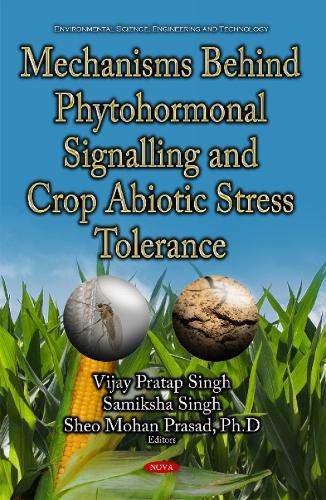Readings Newsletter
Become a Readings Member to make your shopping experience even easier.
Sign in or sign up for free!
You’re not far away from qualifying for FREE standard shipping within Australia
You’ve qualified for FREE standard shipping within Australia
The cart is loading…






Environmental stresses, such as heavy metals, drought, radiation, salts, pesticides, temperature, etc. are major factors collectively called abiotic stresses, which limit agricultural productivity. Abiotic stress factors negatively influence the survival, biomass production, and yield of staple food crops of up to 70%. In recent years, much attention has been given for developing strategies to alleviate the adverse effects of abiotic stresses on crops in order to fulfill the food demand of increasing population. Chemical application and agronomical crop management practices have been used to alleviate abiotic stresses with some success. During the last decade, extensive work has been carried out to understand plant hormone-mediated enhancement in abiotic stress tolerance using physiological, biochemical, genetic, molecular, and genomic approaches for crop breeding and management. This book has complied recent research on plant hormone mediated regulation of abiotic stress tolerance in plants with special emphasis on crops. This book consists of fourteen chapters dealing with recent research made in the direction of plant hormone and abiotic stress tolerance in crop plants. Chapter One deals with abiotic stress and crop productivity. Chapters Two and Three deal with the role of polyamines, ROS, and melatonin in the regulation of abiotic stresses. Chapter Four extensively elaborates the significance of the multigene family in the improvement of crops under stress conditions. Chapters Five and Six deal with the interaction of plant hormones and their subsequent impact on plant abiotic stress tolerance. Chapter Seven, Eight and Nine comprehensively deal with the role of abscisic acid and gibberellic acid signaling in the regulation of abiotic stress tolerance in crops. Chapters Ten through Thirteen describe the role of brassinosteroids cross talk, interaction and signaling in the regulation of abiotic stress tolerance in crops. Chapter Fourteen deals with the emerging role of oxylipins in the regulation of abiotic stress in crops. Chapter Fifteen deals with the role of jasmonic acid and salicylic acid signaling in the regulation of abiotic stress tolerance. This book has gathered recent information of plant hormone research and abiotic stress tolerance in crops. We hope that this book will be very useful for graduate and post graduate students and researchers.
$9.00 standard shipping within Australia
FREE standard shipping within Australia for orders over $100.00
Express & International shipping calculated at checkout
Environmental stresses, such as heavy metals, drought, radiation, salts, pesticides, temperature, etc. are major factors collectively called abiotic stresses, which limit agricultural productivity. Abiotic stress factors negatively influence the survival, biomass production, and yield of staple food crops of up to 70%. In recent years, much attention has been given for developing strategies to alleviate the adverse effects of abiotic stresses on crops in order to fulfill the food demand of increasing population. Chemical application and agronomical crop management practices have been used to alleviate abiotic stresses with some success. During the last decade, extensive work has been carried out to understand plant hormone-mediated enhancement in abiotic stress tolerance using physiological, biochemical, genetic, molecular, and genomic approaches for crop breeding and management. This book has complied recent research on plant hormone mediated regulation of abiotic stress tolerance in plants with special emphasis on crops. This book consists of fourteen chapters dealing with recent research made in the direction of plant hormone and abiotic stress tolerance in crop plants. Chapter One deals with abiotic stress and crop productivity. Chapters Two and Three deal with the role of polyamines, ROS, and melatonin in the regulation of abiotic stresses. Chapter Four extensively elaborates the significance of the multigene family in the improvement of crops under stress conditions. Chapters Five and Six deal with the interaction of plant hormones and their subsequent impact on plant abiotic stress tolerance. Chapter Seven, Eight and Nine comprehensively deal with the role of abscisic acid and gibberellic acid signaling in the regulation of abiotic stress tolerance in crops. Chapters Ten through Thirteen describe the role of brassinosteroids cross talk, interaction and signaling in the regulation of abiotic stress tolerance in crops. Chapter Fourteen deals with the emerging role of oxylipins in the regulation of abiotic stress in crops. Chapter Fifteen deals with the role of jasmonic acid and salicylic acid signaling in the regulation of abiotic stress tolerance. This book has gathered recent information of plant hormone research and abiotic stress tolerance in crops. We hope that this book will be very useful for graduate and post graduate students and researchers.